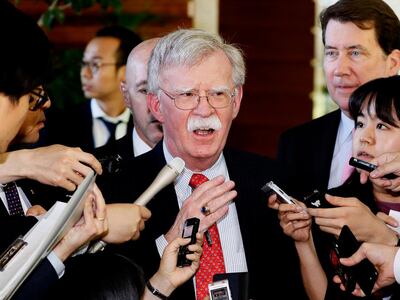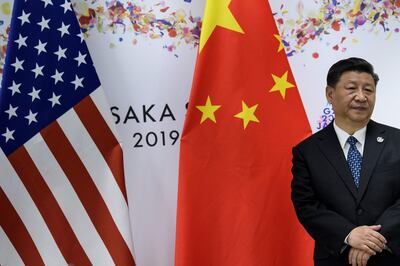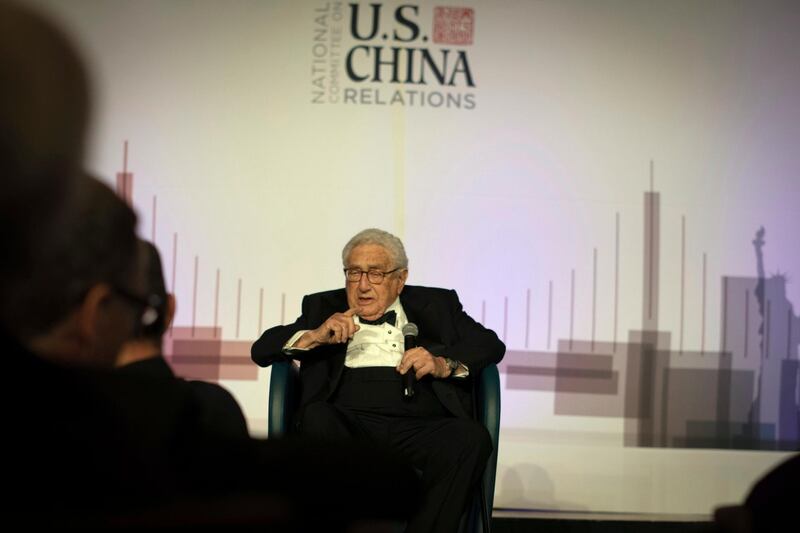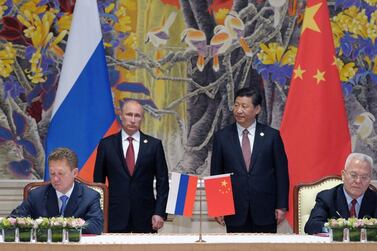The former US Secretary of State Henry Kissinger may be a controversial figure but the 96-year-old's advice is still sought out around the world, and the wise put aside any differences they may have with him and listen when he speaks.
One such occasion was last week. Talking at the National Committee on US-China Relations in New York Mr Kissinger warned that hostilities between the two countries would be "inevitable" and result in "a catastrophic outcome" that could be "worse than world wars" – unless leaders on both sides "realise the future of the world depends on the two sides working out solutions and managing the inevitable difficulties."
“There is no doubt many aspects of the evolution of China are challenging to the US,” he said. "It never happened before that two major countries in different parts of the universe were in similar positions.”
If this is a familiar argument that is partly because the Harvard professor Graham Allison's 2017 book Destined for War: Can America and China Escape Thucydides's Trap? has become a shorthand for the idea that just as with Sparta and Athens in ancient times, so the rise of China and the fear that this instills in America today may make war inevitable, alarming and unbelievable as that sounds. Many others have pretty much suggested that this is the natural, Hobbesian order of nature: a hegemon in relative decline is unwilling to cede its place to a newly vibrant successor, making conflict certain.
But there is a risk here of succumbing far too easily to a very dangerous fatalism, with some military hawks such as John Bolton, the former US national security adviser, giving every impression of wanting to take recklessly to the battlefield to ensure that America's will prevails. Which is why Mr Kissinger's warning should be taken seriously, and the question should be asked: just why are so many so fearful that this apocalyptic scenario is unavoidable?

At one level it does seem not just far-fetched but very far-off, and Chinese officials have been at pains to make clear that they wish their resurgence to be on peaceful terms that provide “win-win” results for both them and their partners. At the same time, there is genuine nervousness about China's ambitions among its neighbours, and even when joking, the country's maritime claims can sound alarming. “You guys can have the east part of the Pacific, Hawaii to the States,” the Princeton academic Aaron Friedberg has reported a Chinese admiral saying in jest to an American counterpart. “We'll take the west, from Hawaii to China.”
Chinese President Xi Jinping's rhetoric of a “Chinese dream” has encouraged even greater patriotism and raised expectations about the country's future. There are worries that social discontent could follow if the economy does not perform well enough, with possible pressure from some quarters for the leadership to take a more forthright position internationally.

But it is also true there has been a western assumption that China's intentions are malign, even when its representatives are acting in a way that European and American countries have long done. The British Council, for instance, is clearly an instrument of UK soft power that projects British values and interests abroad – and is generally considered to be an organisation in good standing. China's Confucius Institutes, on the other hand, exist to promote Chinese language and culture but are now facing calls to be banned left, right and centre.
On the US side, one of the few silver linings to the Trump presidency is the commander-in-chief's often stated desire to bring his troops home, not send more of them abroad. Interestingly, a recent survey showed that a majority of veterans were with Mr Trump in being against endless military interventions whose purpose was to change other states, rather than defending America. Mr Trump may talk tough – he long described Mr Jinping as a "friend" before turning on him in August when he called him an "enemy" – but the 16-month trade war he initiated may be drawing to a close, with White House economic adviser Larry Kudlow saying that the two sides are nearing an agreement.
That is not only to be welcomed, but emphasises the biggest reason why no one on either side should even vaguely contemplate war: in 2018 total trade between the US and China was worth $660 billion. The current skirmishing has already hurt American farmers badly; risking the larger figure would be madness.
So listen to Mr Kissinger, all who warn darkly of conflict. His distant successor as national security adviser, Mr Bolton, may have been guided by the Roman saying "if you want peace, prepare for war" but none should focus so strongly on military preparations that they lose sight of the fact that their aim is to prevent what Mr Kissinger rightly calls a "catastrophic outcome". Neither side could earn a victory that deserved the name. Spending a little more time on "working out solutions", as Mr Kissinger put it, would be a good idea, while not demonising China as an "enemy" would be a good start.
Sholto Byrnes is a commentator and consultant in Kuala Lumpur and a corresponding fellow of the Erasmus Forum






